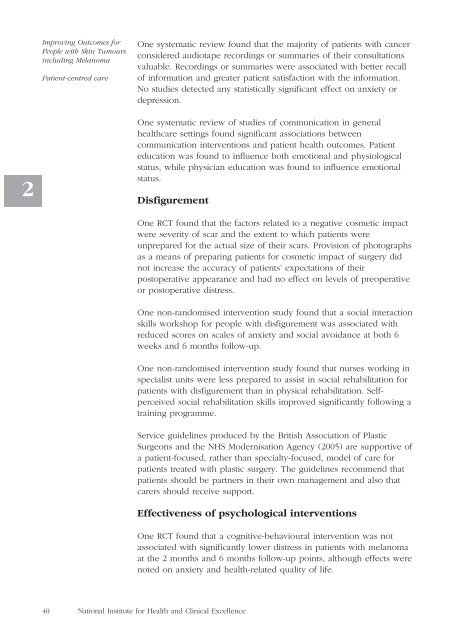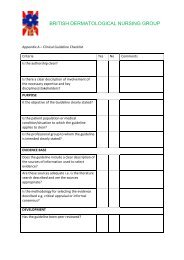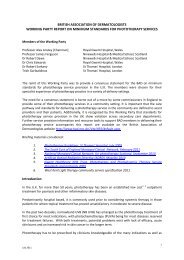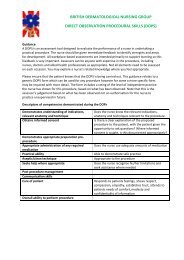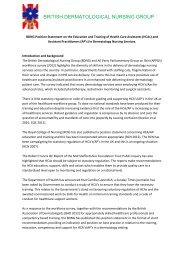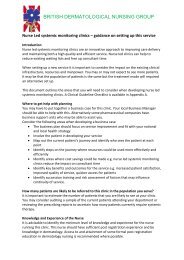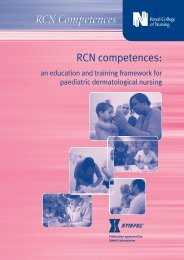Improving outcomes for people with skin tumours including melanoma
Improving outcomes for people with skin tumours including melanoma
Improving outcomes for people with skin tumours including melanoma
Create successful ePaper yourself
Turn your PDF publications into a flip-book with our unique Google optimized e-Paper software.
<strong>Improving</strong> Outcomes <strong>for</strong><br />
People <strong>with</strong> Skin Tumours<br />
<strong>including</strong> Melanoma<br />
Patient-centred care<br />
One systematic review found that the majority of patients <strong>with</strong> cancer<br />
considered audiotape recordings or summaries of their consultations<br />
valuable. Recordings or summaries were associated <strong>with</strong> better recall<br />
of in<strong>for</strong>mation and greater patient satisfaction <strong>with</strong> the in<strong>for</strong>mation.<br />
No studies detected any statistically significant effect on anxiety or<br />
depression.<br />
2<br />
One systematic review of studies of communication in general<br />
healthcare settings found significant associations between<br />
communication interventions and patient health <strong>outcomes</strong>. Patient<br />
education was found to influence both emotional and physiological<br />
status, while physician education was found to influence emotional<br />
status.<br />
Disfigurement<br />
One RCT found that the factors related to a negative cosmetic impact<br />
were severity of scar and the extent to which patients were<br />
unprepared <strong>for</strong> the actual size of their scars. Provision of photographs<br />
as a means of preparing patients <strong>for</strong> cosmetic impact of surgery did<br />
not increase the accuracy of patients’ expectations of their<br />
postoperative appearance and had no effect on levels of preoperative<br />
or postoperative distress.<br />
One non-randomised intervention study found that a social interaction<br />
skills workshop <strong>for</strong> <strong>people</strong> <strong>with</strong> disfigurement was associated <strong>with</strong><br />
reduced scores on scales of anxiety and social avoidance at both 6<br />
weeks and 6 months follow-up.<br />
One non-randomised intervention study found that nurses working in<br />
specialist units were less prepared to assist in social rehabilitation <strong>for</strong><br />
patients <strong>with</strong> disfigurement than in physical rehabilitation. Selfperceived<br />
social rehabilitation skills improved significantly following a<br />
training programme.<br />
Service guidelines produced by the British Association of Plastic<br />
Surgeons and the NHS Modernisation Agency (2005) are supportive of<br />
a patient-focused, rather than specialty-focused, model of care <strong>for</strong><br />
patients treated <strong>with</strong> plastic surgery. The guidelines recommend that<br />
patients should be partners in their own management and also that<br />
carers should receive support.<br />
Effectiveness of psychological interventions<br />
One RCT found that a cognitive-behavioural intervention was not<br />
associated <strong>with</strong> significantly lower distress in patients <strong>with</strong> <strong>melanoma</strong><br />
at the 2 months and 6 months follow-up points, although effects were<br />
noted on anxiety and health-related quality of life.<br />
40<br />
National Institute <strong>for</strong> Health and Clinical Excellence


